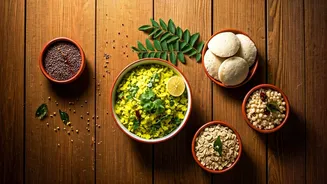Poha: A Classic Choice
Poha, a staple in many Indian households, makes a wonderful breakfast option for those watching their cholesterol. This dish is made with flattened rice,
which is not only easy to digest but also relatively low in calories and saturated fat. Prepare it with mustard seeds, curry leaves, onions, and turmeric for a flavorful experience. Ensure you use minimal oil for cooking and add vegetables like peas and carrots for an extra dose of nutrients. The fiber content in poha helps in reducing cholesterol absorption. A portion of poha can fill you up without significantly impacting your cholesterol levels, making it a healthy and satisfying breakfast choice. Consider adding a squeeze of lemon juice for added flavor and vitamin C boost, and garnishing with fresh coriander leaves for an appealing finish.
Upma: A Savory Delight
Upma, another popular South Indian breakfast, can be easily adapted to be cholesterol-friendly. Traditionally made with semolina (rava), upma can be prepared in a healthier way by using less oil and incorporating vegetables. Instead of frying the semolina, dry roast it to reduce the oil needed during cooking. Include ingredients like onions, tomatoes, carrots, and beans to boost the fiber and vitamin content. You can also experiment with other grains like oats or broken wheat to increase the nutritional value. The addition of vegetables provides important dietary fiber, which aids in lowering cholesterol levels. Seasoning upma with mustard seeds, curry leaves, and a touch of asafoetida provides flavor without the need for excessive amounts of unhealthy fats. This breakfast offers a filling and nutritious way to start your day without impacting your cholesterol levels negatively.
Oats Idli: A Healthy Twist
Idli, a steamed rice cake, is a favorite across South India. To make it cholesterol-friendly, consider a twist by incorporating oats into the recipe. Oats are high in soluble fiber, which helps reduce cholesterol levels. Replace a portion of the rice with oats in your idli batter. This also enhances the texture and nutritional profile of the idli. Combine oats with urad dal (black lentils), rice, and the usual idli ingredients. The result is a fluffy, yet heart-healthy idli that’s perfect for breakfast. Serve these oats idlis with a light and nutritious sambar (lentil-based vegetable stew) or a coconut chutney that is made with minimal oil, creating a balanced and health-conscious meal. This breakfast option provides you with a delicious and fulfilling way to manage your cholesterol levels without compromising on taste.
Besan Chilla: Savory Pancakes
Besan chilla, or chickpea flour pancakes, is a great breakfast choice. Besan, being a legume, is naturally low in cholesterol and rich in fiber and protein. To prepare a cholesterol-friendly version, simply mix besan with water, spices, and finely chopped vegetables like onions, tomatoes, and green chilies. Cook the chilla on a non-stick pan with a minimal amount of oil. The fiber from the besan and vegetables helps in lowering cholesterol absorption. You can also add some grated vegetables like carrots or zucchini to increase the nutritional value. Serve besan chilla with a light chutney or a dollop of yogurt, which can further enhance the protein content and make it a complete breakfast. This option provides a delicious and easy way to enjoy a savory breakfast while keeping your cholesterol levels in check.
Ragi Dosa: Nutrient Powerhouse
Ragi dosa, made from ragi (finger millet) flour, is an excellent breakfast option for managing high cholesterol. Ragi is a rich source of fiber and minerals. It also has a lower glycemic index compared to rice, making it a good choice for those concerned about blood sugar. Prepare the dosa batter by mixing ragi flour with water, a pinch of salt, and spices like cumin and green chilies. You can also add a small amount of rice flour for texture. Cook these dosas on a non-stick pan using minimal oil. Serve ragi dosa with a vegetable-based sambar or a light coconut chutney, ensuring a balanced and nutritious meal. The high fiber content in ragi aids in lowering cholesterol levels by reducing the absorption of dietary cholesterol. Making ragi dosa for breakfast ensures that you start your day with a health-conscious and tasty meal.
Moong Dal Cheela: Protein-Rich
Moong dal cheela, or green gram pancake, is a protein-packed and cholesterol-friendly breakfast choice. Moong dal is naturally low in cholesterol and a great source of protein and fiber. To make cheelas, soak moong dal overnight and blend it into a smooth batter. Add chopped onions, green chilies, and spices. Cook on a non-stick pan using very little oil. These cheelas are light, easy to digest, and very nutritious. The high fiber content in moong dal helps regulate cholesterol levels, while the protein keeps you full and energized throughout the morning. Serve with a mint-coriander chutney or a light vegetable curry for a complete and healthy breakfast. Choosing moong dal cheela provides a delicious, protein-rich, and cholesterol-conscious meal to begin your day.
Vegetable Dalia: Fiber Boost
Dalia, or broken wheat porridge, is an excellent choice for a cholesterol-friendly breakfast. Dalia is high in fiber and helps in lowering cholesterol. Prepare dalia by dry roasting it before cooking. Then, add water or vegetable broth, along with your favorite vegetables like carrots, peas, and beans. Season with spices like turmeric, cumin, and coriander. The addition of vegetables increases the fiber content, further helping to manage cholesterol levels. It's a filling and satisfying breakfast that is easy to customize to your taste preferences. Using minimal oil and focusing on fresh vegetables will make this a heart-healthy meal. Vegetable dalia offers a wholesome, nutritious, and cholesterol-friendly way to kickstart your day.
Sprouted Moong Salad: Refreshing Start
A sprouted moong salad offers a light and refreshing breakfast option that’s also cholesterol-friendly. Sprouted moong beans are rich in nutrients, including fiber and protein, and are very easy to digest. Prepare this salad by combining sprouted moong beans with chopped vegetables like tomatoes, cucumbers, onions, and carrots. Add a squeeze of lemon juice, a pinch of salt, and a dash of pepper for flavor. The fiber from the moong and vegetables aids in lowering cholesterol levels. This salad provides a light yet filling breakfast option that is packed with nutrients. This breakfast is not only easy to prepare but is also a refreshing and health-conscious way to start the day. You can add a few chopped herbs like coriander or mint to enhance the flavor.
Oatmeal: Classic & Healthy
Oatmeal is an old and trusted breakfast choice. Oats are well-known for their soluble fiber content, which helps in lowering cholesterol levels. Prepare oatmeal with water or low-fat milk, and add a variety of toppings to make it more appealing. Include fruits like berries, bananas, or apples, which provide additional vitamins and fiber. Consider adding nuts and seeds for healthy fats and extra fiber. Avoid adding excessive amounts of sugar or sweeteners. Oatmeal is a versatile breakfast option that is both filling and nutritious, making it an excellent choice for anyone looking to manage their cholesterol levels. This simple and adaptable breakfast provides a delicious and health-conscious start to your day.
Idli with Sambar: South Indian Classic
Idli with sambar is a quintessential South Indian breakfast. This combination can be a healthy choice, provided you make a few adjustments. Idli, made from fermented rice and urad dal, is relatively low in fat. The fermentation process makes it easy to digest. Sambar, a lentil-based vegetable stew, is typically packed with vegetables and spices, making it a good source of fiber and nutrients. To make this meal cholesterol-friendly, ensure the sambar is prepared with minimal oil and a variety of vegetables. Avoid excessive use of coconut in the sambar. This classic breakfast provides a balanced and nutritious start to your day. It’s light, flavorful, and a great way to enjoy a traditional meal while being mindful of your cholesterol levels.




















